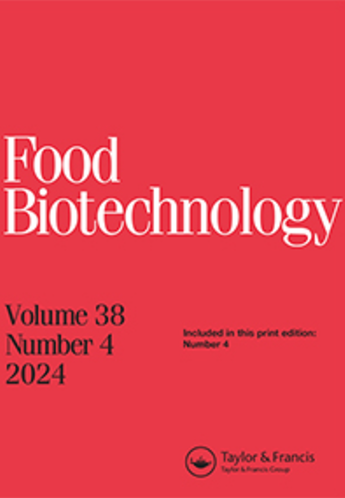马氏克鲁维酵母的遗传变异及其对发酵参数的影响
IF 1.6
4区 农林科学
Q4 BIOTECHNOLOGY & APPLIED MICROBIOLOGY
引用次数: 0
摘要
摘要本研究旨在通过核型比较青海不同地区马氏K. marxianus菌株的遗传谱。采用脉冲场凝胶电泳(PFGE-CHEF)分析了马氏K. marxianus的核型。聚类分析采用UPGMA算法对Pearson’s相关矩阵进行聚类计算,并对一些无法解析确定的参数采用数学模型进行描述。马氏K. marxianus菌株有17种不同的染色体模式,分为2个簇。聚类I仅包含参考菌株K. marxianus (CBS397)。然而,获得的一些核型显示出相似的发酵行为,而其他核型则显示出不同的发酵行为。因此,从不同的发酵环境中区分菌株是可能的。除了核型为XII的菌株外,从mezcal中分离的菌株没有表现出显著的差异,因此获得遗传和发酵行为之间关系的信息是针对不同技术应用进行菌株选择的工具。致谢第一作者感谢CONACYT的资助(465646 CVU 664786),同时也感谢CONACYT在Ciencia项目Básica(252465)和TECNM项目(10197.21-P)中的资金支持。披露声明作者未报告潜在的利益冲突。本文章由计算机程序翻译,如有差异,请以英文原文为准。
Genetic Variability and Its Influence on the Fermentative Parameters of Kluyveromyces marxianus
ABSTRACTThis research aimed to compare the genetic profile by karyotypes of strains of K. marxianus from different regions in México. K. marxianus karyotypes were analyzed by pulsed-field gel electrophoresis (PFGE-CHEF). The Cluster analysis was calculated by clustering the Pearson´s correlations matrix using the UPGMA algorithm, and mathematical models were used to describe some parameters that could not be determined analytically. K. marxianus strains showed 17 different chromosomal patterns divided into two Clusters. Cluster I only include the reference strain K. marxianus (CBS397). However, obtaining some karyotypes showed similar fermentative behaviours, while others had different fermentative behaviours. Therefore, it has been possible to differentiate a strain from different fermentation environments. The strains isolated from mezcal do not show significant differences except the strain with karyotype XII therefore obtaining information on the relationship between genetic and fermentative behaviour is a tool for strain selection for different technological applications.KEYWORDS: Kluyveromyces marxianusbioinformaticsfermentationaromayeast AcknowledgmentsThe first author thanks to CONACYT for the grant aided support No. 465646 CVU 664786, Also to the CONACYT by the financial support in the project Ciencia Básica No. 252465 and TECNM project No. 10197.21-P.Disclosure statementNo potential conflict of interest was reported by the author(s).
求助全文
通过发布文献求助,成功后即可免费获取论文全文。
去求助
来源期刊

Food Biotechnology
工程技术-生物工程与应用微生物
CiteScore
3.80
自引率
0.00%
发文量
15
审稿时长
>12 weeks
期刊介绍:
Food Biotechnology is an international, peer-reviewed journal that is focused on current and emerging developments and applications of modern genetics, enzymatic, metabolic and systems-based biochemical processes in food and food-related biological systems. The goal is to help produce and improve foods, food ingredients, and functional foods at the processing stage and beyond agricultural production.
Other areas of strong interest are microbial and fermentation-based metabolic processing to improve foods, food microbiomes for health, metabolic basis for food ingredients with health benefits, molecular and metabolic approaches to functional foods, and biochemical processes for food waste remediation. In addition, articles addressing the topics of modern molecular, metabolic and biochemical approaches to improving food safety and quality are also published.
Researchers in agriculture, food science and nutrition, including food and biotechnology consultants around the world will benefit from the research published in Food Biotechnology. The published research and reviews can be utilized to further educational and research programs and may also be applied to food quality and value added processing challenges, which are continuously evolving and expanding based upon the peer reviewed research conducted and published in the journal.
 求助内容:
求助内容: 应助结果提醒方式:
应助结果提醒方式:


